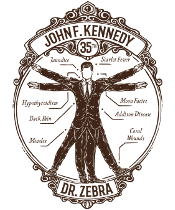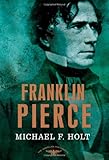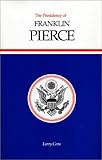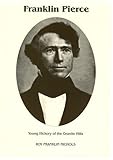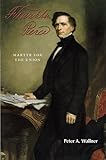

Health and Medical History of President
Franklin PierceLived 1804-1869
Health and Medical History of President
Franklin PierceLived 1804-1869
1776-1783
1812-1815
1846-1848
1861-1865
1898-1899
1917-1918
1941-1945
1950-1953
1964-1975
1990-1991
2001-2021

As a busy attorney his mid-to-late 30s (circa 1842), he was able to sleep anywhere, anytime (day or night), so that an hour's recess in court would allow him to nap and awake refreshed. Colleagues spoke of his "wonderful recuperative powers." 2d. Comment: The unusual comment about recuperative powers suggests that Pierce was doing more than just working hard, i.e. consuming alcohol to excess. Despite its initial soporific effect, alcohol can disrupt sleep in the latter part of the night and thereby leave a person sleepy during the day. It is possible, therefore, that his ability to sleep on demand reflected a high alcohol intake.
The illness recurred in February 1834: "The question for some time was to faint or not to faint -- I at length succeeded in mustering sufficient energy to reach the bell rope & ring up a servant." After taking calomel and other unspecified medications, he recovered quickly 2h.
The term "bilious fever" is no longer used; its meaning is uncertain 1b. It often indicated malaria, but New Hampshire and Maine were free of malaria during Pierce's lifetime 6.
Pierce took a pledge stop drinking before leaving the Senate in 1842, but broke it in Mexico during the war, when he was apart from his wife's puritanical influence. 2l. There is no suggestion that alcohol impaired Pierce's military performance 2m, but during the presidential election campaign of 1852 this did not stop someone from writing a letter to his hometown newspaper calling him "the Hero of Many a well-fought bottle" 2n. Stories of Pierce's drinking persisted throughout the campaign 2o.
By June, Pierce was back home in New Hampshire, engaged in vigorous physical work on his farm 2q.
Even so, during the 1852 presidential campaign, Pierce's friend and official campaign biographer, Nathaniel Hawthorne, remarked that "His talents are administrative. ... There are scores of men in the country that seem brighter than he is" 2t.
Pierce recited his 33-minute inaugural speech from memory 2u.
He was not so lucky at the Battle of Contreras on August 19. Riding his horse at top speed over a rocky lava bed, the horse suddenly reared up (probably startled by the sound of Mexican artillery), throwing Pierce against the pommel of the saddle before stumbling and falling onto him. Pierce was knocked senseless. With intense pain in his groin and a debilitating knee injury, Pierce sat amidst some rocks in the middle of the artillery fire for half an hour, until he could stand. He then hobbled over to an American brigade that was under heavy fire. The brigade surgeon, ^^ "ritchey4pierce"|doc43("Ritchey") ^^ reduced Pierce's dislocated knee and bandaged his pelvis. 2w 1c
Pierce stayed in the field until 9 pm. The fighting had stopped at nightfall, and Pierce now ordered his regiments to withdraw. He took refuge from the rain in the back of an ammunition wagon. 2w.
Orders for the next morning required rapid movement on foot, so Pierce ceded command to his deputy and reported to the commanding general (Winfield Scott) for further orders 2x. Scott later wrote that Pierce "was in such a sick, wounded, and enfeebled condition, that he was `just able to keep his saddle!`" 2y. (Ironically, Pierce and Scott ran against each other for the presidency in 1852.) Scott ordered him to the rear, but Pierce successfully protested and returned to lead his brigade in the next action, which required a 1.5 mile march through corn fields, marshes, and ditches. Pierce, again on horseback, was able to jump several ditches, but when he dismounted to walk over soft terrain, the pain in his knee caused him to pass out after about 300 yards. Pierce once again ceded command, after ordering his men to leave him where he was. His brigade saw heavy action later that day, without him. 2x
Hoisted into his saddle on the 22nd, Pierce rode 2.5 miles to participate in a lengthy meeting that lasted through the night and ended with an armistice agreement. He was then able to rest. 2z By September 12, however, he was prostrate with diarrhea 2aa.
During the 1852 presidential election, his opponents intimated that cowardice caused him to miss battles in the war 7a.
Six days later, Franklin wrote Jefferson Davis (yes, that Jefferson Davis): "Mrs. Pierce is more composed today, tho very feeble and crushed to the Earth by the fearful bereavement" 2ad. In the same letter, Pierce wrote: "How shall I be able to summon my manhood and gather up my energies for the duties before me it is hard for me to see" 2ad. (Given Davis' future role, it would be interesting to study whether the tragedy brought Davis and Pierce closer together.)
Two weeks after the accident, Pierce was back at work but with "a fixed expression of sorrow & despondency" 2ae, seeming to be weak and easily manipulated 2af.
The Pierces were shattered and wracked with guilt. Jane decided that God had taken their son so her husband would have no family distractions while President. Franklin believed it was punishment for his sins. The Pierces never really recovered from the tragedy 7b.
In his inaugural address, Pierce said to his listeners (which did not include his wife, as she did not attend the ceremonies): "You have summoned me in my weakness, you must sustain me by your strength" 2ag.
Comment: Though called a severe cold, this illness was obviously something more, possibly pneumonia 1e. Alcohol over-use increases the risk of several types of pneumonia.
Comment: In view of Pierce's alcohol abuse, it is reasonable to ask whether that had a hand in shaping the disastrous slavery-coddling policies of his presidency, especially given his deep roots in anti-slavery New Hampshire. Certainly, there must have been some effect, but Pierce's anti-anti-slavery attitudes had been formed in the early 1840s, as a result of two factors: (1) It offended him that a moral consideration might supersede the Constitution, and (2) It offended him that anyone who disagreed with abolitionists was labeled a sinner in a manner that amounted to "religious bigotry." 2ai. Pierce personally disdained slavery 2aj.
- Like Andrew Jackson and Abraham Lincoln, Pierce became embroiled in a duel. His role was not as central, but the duel was much more notorious as it involved two sitting Congressmen. His college friend, Jonathan Cilley, bled to death, just over the District line, in Maryland, after Congressman Henry Wise shot him in the groin with a rifle. Leading up to the duel Pierce advised Cilley, but could not dissuade his friend from accepting the challenge. 2ak
- Pierce was physically attractive, which was an asset in the courtroom 2al.
- During the Mexican-American war in 1847, Pierce deployed by sea to Vera Cruz. Most of the men in his brigade got seasick, but Pierce did not, retaining a healthy appetite on the trip. Once in Mexico, he and his men enjoyed relative freedom from the "vomito" (food poisoning, one assumes) 2am.
- Pierce's mother, Anna Kendrick Pierce, died in December 1838 at age 70 10a. He wrote that "her faculties were gone" in recent years. She had earlier been mentally unstable. 2an
- Pierce delivered his inaugural address in a clear loud voice that could be heard by most of the crowd of 15,000 listeners 2u.
- Pierce's wife, Jane, was "exceedingly shy, nervous, and continually in poor health" as well as highly religious 2ao. When Nathaniel Hawthorne, a close friend of Pierce's, contemplated the morose Jane as First Lady, he wrote: "I wish he had a better wife, or none at all. It is too bad that the nation should be compelled to see such a death's head in the pre-eminent place among American women" 2ap. Hawthonre neglected to consider that she did keep her husband from drinking -- when her was around her, at least 2ap.
- Bumgarner, John R. The Health of the Presidents: The 41 United States Presidents Through 1993 from a Physician's Point of View. Jefferson, NC: MacFarland & Company, 1994.
 a p.83. From John W. Forney, who accompanied Pierce to the 1853 New York World's Fair b p.80 c p.82. Pelvic fracture seems unlikely given Pierce's extended time in the saddle after the injury d pp.82-83 e pp.83 f p.83 g pp.83-84 h p.83-84
a p.83. From John W. Forney, who accompanied Pierce to the 1853 New York World's Fair b p.80 c p.82. Pelvic fracture seems unlikely given Pierce's extended time in the saddle after the injury d pp.82-83 e pp.83 f p.83 g pp.83-84 h p.83-84Comment: Devotes one chapter to each President, through Clinton. Written for the layperson, well-referenced, with areas of speculation clearly identified, Dr. Zebra depends heavily on this book. Dr. Bumgarner survived the Bataan Death March and has written an unforgettable book casting a physician's eye on that experience.
- Wallner, Peter A. Franklin Pierce: New Hampshire's Favorite Son. Concord, NH: Plaidswede Publishing, 2004.
- Radbill, Samuel X. Whooping cough in fact and fancy. Bulletin of the History of Medicine. 1943; 13 (1): 33-53. Available on the web at: https://www.jstor.org/stable/44449087
- Weston, Robert. Whooping Cough: A Brief History to the 19th Century. Canadian Bulletin of Medical History. 2012; 29 (2): 329-349. Available on the web at: https://doi.org/10.3138/cbmh.29.2.329
- T. E. C. "Whooping Cough is First Described as a Disease Sui Generis by Baillou in 1640". Pediatrics. 1970, 46 (4) 522. Available on the web at: https://pediatrics.aappublications.org/content/46/4/522
Comment: "Chincough" is not an anatomical term. It instead comes from "Quintana" -- thought to indicate a cough occurring at 5-hour intervals.
- Adams, J. F. A. Malaria in New England. Public Health Papers and Reports. 1881; 7: 168-173. Available on the web at: https://www.ncbi.nlm.nih.gov/pmc/articles/PMC2272395/
Comment: One would have to review Pierce's complete travel history to determine that he was never in a malaria zone before going to Mexico.
- Boller, Paul F. Jr. Presidential Anecdotes. New York: Oxford University Press, 1981.
 a p.114 b p.115 c p.116
a p.114 b p.115 c p.116 - Dugan, James. Bedlam in the boudoir. Colliers. 22 Feb. 1947; pages 17, 69-70.
Comment: Credibility is dubious. Just before a list of Presidents, the article states: "Twenty of the 32 Presidents ... are proved or believed on a thick web of circumstance to have been nocturnal nuisances in the White House."
- MacMahon, Edward B. and Curry, Leonard. Medical Cover-Ups in the White House. Washington, DC: Farragut, 1987.
 a p.19
a p.19 - Montgomery-Massingberd, Hugh (ed). Burke's Presidential Families of the United States of America. 2nd ed. London: Burke's Peerage Limited, 1981.
 a p.265
a p.265Comment: Maps -- in great detail -- the ancestors and descendants of American presidents through Ronald Reagan. They would have had an exhausting time with President Obama's family tree! MORE
